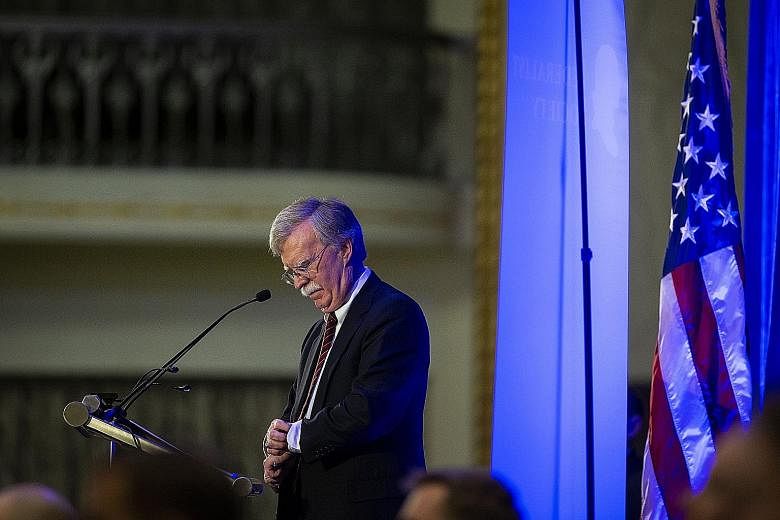WASHINGTON • • US President Donald Trump has authorised new, classified orders for the Pentagon's cyber warriors to conduct offensive attacks against adversaries more freely and frequently, the White House has said, wiping away Obama-era restrictions that his advisers viewed as too slow and cumbersome.
"Our hands are not as tied as they were in the Obama administration," National Security Adviser John Bolton told reporters in announcing a new cyber strategy.
Mr Bolton rewrote a draft of the strategy after joining the administration in April. Many of his remarks on Thursday focused on a secret order - which Mr Trump signed last month, but which has never been publicly described - that appears to give far more latitude for the newly elevated US Cyber Command to act with minimal consultation from a number of other government agencies.
The order essentially delegates more power to General Paul Nakasone, who took over this year as director of the National Security Agency and commander of US Cyber Command.
During his Senate confirmation hearing in March, Gen Nakasone complained that America's online adversaries attacked with little concern about retaliation.
"I would say right now they do not think that much will happen to them," said Gen Nakasone, who previously oversaw the army's cyber command. "They don't fear us."
But this month, he said he was more comfortable with the new guidance issued by the White House, even though the administration has not made any of it public.
Senior officials have said that it eliminates a lengthy process of consensus-building across the government - the departments of Commerce, Treasury and Homeland Security among them - before the United States conducts an offensive action.
It is not clear whether Mr Trump must still approve every major offensive online operation, as presidents George W. Bush and Barack Obama did. Mr Bolton did not shed much light. "Our presidential directive effectively reversed those restraints, effectively enabling offensive cyber operations through the relevant departments," he said.
He said that since Mr Trump took office, the administration has "authorised cyber operations" against rivals, though he gave no details.
Much of the strategy that was made public on Thursday strongly echoes similar documents issued by Mr Obama and Mr Bush. They focus on improving digital defences for the government, bettering training, working with private industry to share information about vulnerabilities and working with allies.
The Defence Department strategy also calls for "defending forward, confronting threats before they reach US networks".
The strategy also makes more explicit the Defence Department's role in deterring or defeating cyber operations targeting US critical infrastructure that are "likely to cause a significant cyber incident".
US Cyber Command has always been tasked with defending the nation against attacks while operating outside US borders.
But now defensive activity will take place in the context of "day-to-day great power competition" rather than in crisis.
Part of the strategy calls for the US to develop what it describes as an international cyber deterrence initiative, which sounds similar to efforts to develop a theory of nuclear deterrence.
The document provides few details, but says the Trump administration will build "a coalition and develop tailored strategies to ensure adversaries understand the consequences of their malicious cyber behaviour".
Some of those efforts have begun: The US accusations against North Korea and Russia last year were immediately echoed by Britain and other Western powers.
Representative Jim Langevin, a Rhode Island Democrat, who has been active in developing new cyber strategies, said the White House approach was focused "in starkly offensive terms".
"I agree that our adversaries need to know that we can - and will - challenge them in cyber space," Mr Langevin said. "But as the country with the most innovative economy in the world, we must also acknowledge the abiding interest of the United States in encouraging stability in this domain."
NYTIMES, WASHINGTON POST

